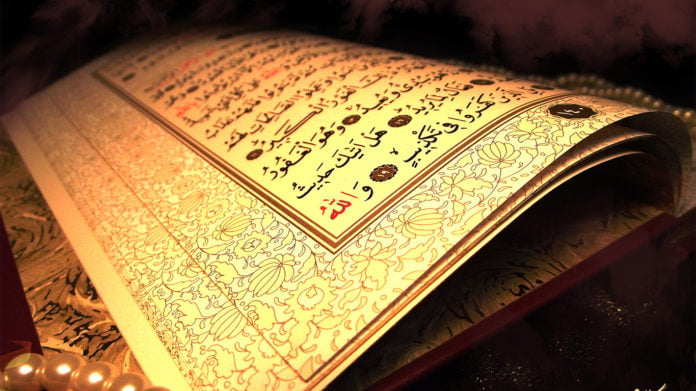| 1) Have We not expanded your breast for you, 2) and relieved you of your burden 3) which weighed down so heavily on your back, 4) and raised your renown high? 5) For truly with hardship comes ease; 6) truly with hardship comes ease. 7) So when you have finished, work on, 8) and turn all your attention to your Lord. |
Allah says, recounting His favours bestowed upon His Messenger, Have We not expanded your breast for you such that it readily accepts the laws of the religion, the duty of calling to Allah, it absorbs all the many facets of fine conduct, directs its attention to the Hereafter, and eagerly performs all good deeds.[1] And relieved you of your burden, your sin which weighed down so heavily on your back? Allah says in another place, That Allah may forgive thee thy faults of the past and those to follow,[2] And raised your renown high, such your lot is lofty and fine praise. No other creature has reached such a station. Hence, on many occasions, Allah is not mentioned except that His Messenger is mentioned alongside Him, such as when articulating the testimony of faith when accepting Islam, or during the Call to Prayer, or the Iqamah for Prayer, and in sermons.
The hearts of his nation contain such love, magnification, and veneration for him that is not to be found for any other besides Allah, Most High. May Allah grant him the best of rewards on behalf of his nation, a reward better than that granted to any other Prophet. Truly with hardship comes ease; truly with hardship comes ease, in this lies great tidings! Each time a person is best with hardship and difficulty, ease comes with it and accompanies it. If hardship entered the hole of a lizard, ease would enter with it and remove it![3] Allah, Most High, says, Allah will vouchsafe, after hardship, ease.[4] The Prophet ﷺ said, Relief accompanies distress, and with hardship come ease.
In these two verses the word hardship has been preceded by the definite article prefix thereby proving that it is one. The word ease has been left indefinite, thereby proving that it occurs repeatedly. Hence one hardship will never overcome two eases.[5] Moreover, in its being give the definite article, the word hardship incorporates all manner of difficulties, and therefore this verse proves that no matter what the hardship, no matter how great, ease must follow.
Then Allah orders His Messenger, specifically, and therefore all the believers indirectly, to be grateful to Him and to establish the dictates of gratitude: So when you have finished, all your duties, and there no longer remains anything in your heart that would hinder it, work on, in worship and supplication. Be not of those who, when they are free, waste their time and turn away from their Lord and His remembrance and as such end up being amongst the losers.
It is also said that the meaning of this is that when you have finished your prayer, expend effort in supplication, and the proponents of this opinion went on to say that And turn all your attention to your Lord, means to ask Him to fulfil your needs. Those who followed this latter opinion then used these verses to prove the legality of supplication and remembrance after the prescribed prayers. Allah knows best.
Endnotes
1. Bukhari records on the authority of Anas bin Malik who said,
| ‘Three people came to the Prophet while he was sleeping before revelation came to Him. One of them asked, “Which of them is he?” The middle one said, “He is the best of them.” The last one said, “Take the best of them.” Only that much happened on that night and he did not see them till they came on another night, (after revelation came to him). He saw them, his eyes were asleep but his heart was not – and so is the case with the Prophets: their eyes sleep while their hearts do not sleep. The angels did not talk to him till they carried him and placed him beside the well of Zamzam. Gabriel took charge of him and he cut open (the part of his body) between his throat and the middle of his chest. Taking everything out of his chest and abdomen, he washed it with Zamzam water with his own hands till he cleansed the inside of his body. Then a gold tray containing a gold bowl full of belief and wisdom was brought and Gabriel stuffed his chest and throat and blood vessels with it and then sealed it. He then ascended with him to the heaven of the world and knocked on one of its doors |
2. Fath (48): 2
3. This sentence is recorded as a statement of the Prophet ﷺ by Hakim and Bazzar with a da`if isnad.
4. at-Talaq (65): 7
5. This is a statement of ibn Mas`ud and `Umar recorded by Bayhaqi, Shu`ab al-Iman. It is also reported as a statement of the Prophet ﷺ by Bayhaqi and Hakim with a da`if isnad.
Ibn Kathir said,
| The meaning of these words is that in both occurrences, the word difficulty is appended to the definite article prefix, al, as such it is singular. The word ease is left indefinite; as such there is more than one occurrence of it. Therefore the second reference to difficulty denotes the same as in the first reference, whereas there is more than one instance of ease. |





















